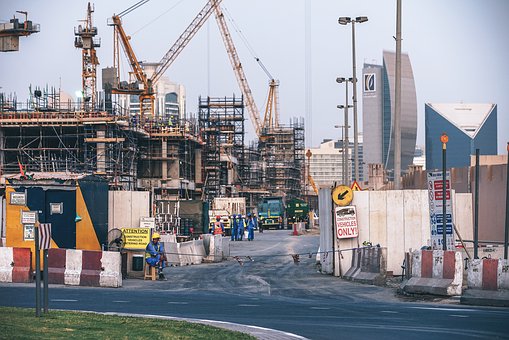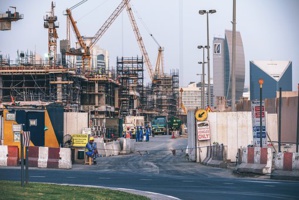Dailycr.com – 25 April 2018 – Avoiding the “negative headlines” of the neighbour Qatar, the federation has shared the challenges it faced to provide the safety of the “migrants labour” who come in large numbers while showing the progress graph on the same which also includes “a new joined up safety initiative”.
The seven emirates federation of the UAE, which includes “Dubai, Abu Dhabi, Ajman, Fujairah, Ras al Khaimah, Sharjah and Umm al Quwain” follows its “health and safety regime” in accordance to the “Federal Labour Law of 1980” that stresses on the main responsibilities as well as roles of employers along with the “labour rights of employees”.
Additionally, in the year of 1981 as well as in 1982, multiple “Ministerial Decisions” were issued as “preventive methods” on employee protection which touched upon “standards of medical care; precautions for hazardous work; and precautions for remote areas and locations”. In the words of the RCC Middle East’s Training provider’s Director, Hasan Alaradi:
“In the late 1970s the federal government started to set up a framework to regulate health and safety, but it was not systematic and more reactive than proactive, evolving in response to major accidents that occurred”.
Furthermore, he noted that the federal has bestowed the power on the individual emirates to come out with their “health and safety laws”; in fact the “free zones” too are given certain freedom for modifying “local rules”. Given the “non-prescribed” nature of the regulations the employers need to have a risk management strategy which bases itself on the “specific work activities and hazards” analysis.
While, Alaradi added:
“For example, the oil and gas industry is not so concerned about trips and falls, but rather about major accidents, such as a hydrocarbon release that could result in an explosion or fire, which places an emphasis on process safety management”.
UAE takes “non-compliance” of safety regulations very seriously, whereby any breach in them is punished which can either be in the form of fines that go up to “Dh10,000 (around £2,000) and/or imprisonment for up to six months”. Also Alaradi informs:
“It used to be the safety guy who got the blame for any failure, but now the law holds directors responsible and accountable for breaches. In one recent case, an inadequate handover between an outgoing and an incoming director resulted in a miscommunication of the hazards that workers were subject to. Someone was killed and, as a result, both directors were jailed.”
However, the construction sector in the UAE exhibits the “worst” safety track record for the “building boom” witnessed by the sector in the “early 2000s” opened doors to a major number of “unskilled labour”. Although, it is hard to get to the official figures but the data from the Abu Dhabi Statistics Centre show that in 2013, the construction sector of the UAE could be held responsible for “47% of total workplace fatalities”. Alaradi, further, stated:
“In contrast to jobs in oil and gas, where people tend to be well looked after and trained, and jobs can last for years, construction workers have often come from poor countries in their thousands and move frequently between projects and countries”.
However, the track record of the same is showing improvements, while the credit could partially be given to “new requirements” which were “issued in Dubai in 2008 and in Abu Dhabi in 2009”. According to HSE:
“Authorities have also made it mandatory for workers to down tools between 12:30pm and 3pm, and for employers to provide shaded areas to prevent sunstroke”.
On the other hand, UAE’s record for “best practice” made the “Abu Dhabi Occupational Safety and Health Center” the winner of an “award at the British Safety Council’s International Safety Awards 2017”. And in concluding noted, Alaradi said:
“If you look at their systematic approach it is excellent. You cannot provide consultancy services in Abu Dhabi unless you have been approved by them, providing proof of relevant training, experience and qualifications. Some emirates are also launching national schemes to develop and appoint health and safety inspectors, working with international bodies to create the relevant qualifications and competency metrics they need”.
References:
healthandsafetyatwork.com
The seven emirates federation of the UAE, which includes “Dubai, Abu Dhabi, Ajman, Fujairah, Ras al Khaimah, Sharjah and Umm al Quwain” follows its “health and safety regime” in accordance to the “Federal Labour Law of 1980” that stresses on the main responsibilities as well as roles of employers along with the “labour rights of employees”.
Additionally, in the year of 1981 as well as in 1982, multiple “Ministerial Decisions” were issued as “preventive methods” on employee protection which touched upon “standards of medical care; precautions for hazardous work; and precautions for remote areas and locations”. In the words of the RCC Middle East’s Training provider’s Director, Hasan Alaradi:
“In the late 1970s the federal government started to set up a framework to regulate health and safety, but it was not systematic and more reactive than proactive, evolving in response to major accidents that occurred”.
Furthermore, he noted that the federal has bestowed the power on the individual emirates to come out with their “health and safety laws”; in fact the “free zones” too are given certain freedom for modifying “local rules”. Given the “non-prescribed” nature of the regulations the employers need to have a risk management strategy which bases itself on the “specific work activities and hazards” analysis.
While, Alaradi added:
“For example, the oil and gas industry is not so concerned about trips and falls, but rather about major accidents, such as a hydrocarbon release that could result in an explosion or fire, which places an emphasis on process safety management”.
UAE takes “non-compliance” of safety regulations very seriously, whereby any breach in them is punished which can either be in the form of fines that go up to “Dh10,000 (around £2,000) and/or imprisonment for up to six months”. Also Alaradi informs:
“It used to be the safety guy who got the blame for any failure, but now the law holds directors responsible and accountable for breaches. In one recent case, an inadequate handover between an outgoing and an incoming director resulted in a miscommunication of the hazards that workers were subject to. Someone was killed and, as a result, both directors were jailed.”
However, the construction sector in the UAE exhibits the “worst” safety track record for the “building boom” witnessed by the sector in the “early 2000s” opened doors to a major number of “unskilled labour”. Although, it is hard to get to the official figures but the data from the Abu Dhabi Statistics Centre show that in 2013, the construction sector of the UAE could be held responsible for “47% of total workplace fatalities”. Alaradi, further, stated:
“In contrast to jobs in oil and gas, where people tend to be well looked after and trained, and jobs can last for years, construction workers have often come from poor countries in their thousands and move frequently between projects and countries”.
However, the track record of the same is showing improvements, while the credit could partially be given to “new requirements” which were “issued in Dubai in 2008 and in Abu Dhabi in 2009”. According to HSE:
“Authorities have also made it mandatory for workers to down tools between 12:30pm and 3pm, and for employers to provide shaded areas to prevent sunstroke”.
On the other hand, UAE’s record for “best practice” made the “Abu Dhabi Occupational Safety and Health Center” the winner of an “award at the British Safety Council’s International Safety Awards 2017”. And in concluding noted, Alaradi said:
“If you look at their systematic approach it is excellent. You cannot provide consultancy services in Abu Dhabi unless you have been approved by them, providing proof of relevant training, experience and qualifications. Some emirates are also launching national schemes to develop and appoint health and safety inspectors, working with international bodies to create the relevant qualifications and competency metrics they need”.
References:
healthandsafetyatwork.com


 The UAE Raises Its Safety Regulation Bars
The UAE Raises Its Safety Regulation Bars





 Companies
Companies